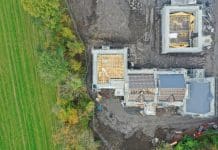Many are concerned about the impact Covid-19 will have on education. It is therefore even more important that school building programmes get back on track as soon as possible to ensure teachers and students have the best possible environments as they make up for lost time. Here, MPBA chief executive Jackie Maginnis considers how Modern Methods of Construction can assist
Back in January, the Department for Education (DfE) revealed the offsite schools framework “to cultivate innovation and modernise the industry by increasing the adoption of Modern Methods of Construction”.
The DfE programme will deliver some 30 offsite schools a year with a projected pipeline of up to £3bn over the next four years. I am gratified that some of our members have been appointed to bring their expertise in volumetric modular technology to the fore, to help deliver these schools as swiftly as possible.
Although many think volumetric modular construction is a new thing, numerous companies have remarkable histories, in some case between 55 to 80-plus years, in providing the highest quality modular buildings, from temporary classrooms to multi-storey teaching blocks complete with offices, catering facilities and welfare accommodation.
The modular building industry has had a remarkable impact on reducing costs while increasing quality and safety. Having gained considerable momentum over the past few years, advanced modular techniques reduce build times by an impressive 50-60%. The demand for customisation has led the industry to develop methods for adaptation during the mass production process to meet individual school’s requirements.
Innovations in volumetric modular technology augment the construction industry with a multitude of benefits that span from greener, healthier environments to maximised sustainability, heavily reduced costs in many cases and faster build times. Doors, windows, heating, plumbing and even washrooms can be factory fitted together with internal and external finishes.
Construction on a working school site is disruptive and presents many health and safety concerns. The noise and dust associated with traditional construction methods can hinder effective teaching and learning together with reducing outdoor space.
Modular approaches are revolutionising the construction industry. While traditional build processes are laced with pitfalls, hidden costs and are highly disruptive – volumetric modular buildings offer predictability of costs and building programmes. They are easy to plan, budget and are quick to erect. Modular technology brings a host of benefits to the education sector; for example, extensions to schools can be manufactured in well-managed factories and craned into position during holiday periods, so there is no disruption.
Offsite technology offers benefits that have had a huge positive impact on the construction industry, bringing longstanding traditional practices up to date. The first key shift away from traditional methods is that build processes take place in controlled factory conditions, which requires a change of mindset and approach.
Historically, manufacturing operations have been considered extensions to construction processes, instead of an integral and important part. This perception is changing. As offsite has become an increasingly dominant force that uses high levels of technology, the lines between manufacturing, engineering and construction have become blurred, creating a need for new skills and redefining existing ones.
As units are factory manufactured, stringent quality control processes can be undertaken within these well-managed environments. These in-house conditions also prevent weather from inhibiting the construction process, guaranteeing efficiency. In addition, modular construction enables site work and building processes to be completed simultaneously, reducing labour costs and build times.
Architectural creativity
Modular builds used to mean prefab cabins but today contemporary modular designs are very different. They are fully compliant with Building Regulations and conceived especially for use as an education space based on current research on how children can learn effectively. They are light and airy and add to the aesthetic of the school. Modular build classrooms can last for decades and many are designed in such a way that they can be moved. Space can be deconstructed and then reconstructed in a new place.
Many contemporary architects are embracing volumetric modular to achieve striking facades with bespoke designs. Public sector clients appreciate cutting-edge building techniques, particularly with the short lead times of modular construction. Modular buildings are energy efficient – reducing ongoing costs for schools, freeing up much needed funds.
Environmental impact
With students becoming more conscious of climate change, it is no small thing for a head teacher to introduce the concept of sustainable construction approaches and how their new building will mitigate environmental impact. The modular way limits the amount of concrete, which is a significant issue for traditional builders. There is also minimal waste, as the classrooms are built to exacting designed specifications and any cut-offs can be reused or recycled – reducing waste to landfill.
Transportation rarely poses issues, as pre-constructed, self-contained units can be shipped to virtually any location. As modules are designed to withstand long-distance transportation and craning on to foundations, they are structurally stronger than most traditionally constructed building materials. This approach reduces traffic to site also decreasing carbon emissions and disruption.
Each individual material can be selected specifically for its performance characteristics, tailoring every inch of a modular build. Eco-friendly materials are often specified and waste is recycled for future projects wherever possible. Not only this, but components are also available in a range of sizes for expansions whenever necessary.
Jackie Maginnis
Chief executive
Modular & Portable Building Association
+44 (0)870 241 7687
Twitter: @MPBAUK
LinkedIn: Modular & Portable Building Association














